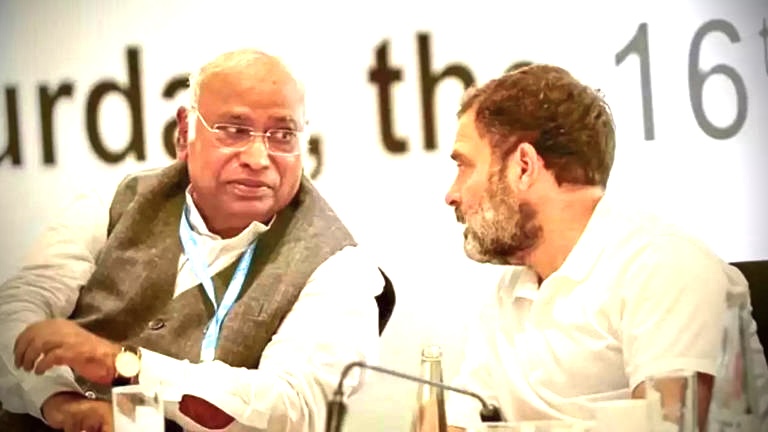The Congress party has embarked on a significant endeavor, engaging in discussions with its ally, the Aam Aadmi Party (AAP) from the INDIA bloc, to chart out seat-sharing arrangements for the imminent Lok Sabha elections. This partnership, initially focusing on regions beyond Delhi and Punjab, signifies a strategic move aimed at broadening its electoral reach. Concurrently, the Congress has initiated dialogues with a spectrum of potential allies as part of a formidable 28-party opposition coalition geared up to challenge the ruling Bharatiya Janata Party (BJP) in the upcoming polls.
At the forefront of this coordination effort lies a five-member committee, spearheaded by Mukul Wasnik, comprising eminent leaders like Ashok Gehlot and Bhupesh Baghel. These key figures have diligently steered consultations with state-level Congress heads, gathering crucial insights to facilitate informed decision-making. Party chief Mallikarjun Kharge has entrusted the responsibility to seasoned leaders, empowering them to orchestrate the intricate process of seat distribution among coalition partners. Meanwhile, the Congress has already solidified pre-poll alliances with influential entities such as the DMK in Tamil Nadu, RJD and JDU in Bihar, JMM in Jharkhand, and others in Assam, bolstering its electoral groundwork.
Despite these commendable strides, securing agreements in pivotal states like Kerala, West Bengal, and Punjab presents a formidable challenge due to the intricate dynamics within the opposition alliance. In West Bengal, the landscape is riddled with complexities as the Trinamool Congress (TMC) and the Left Front, both integral components of the opposition alliance, remain averse to any collaborative arrangements with each other. Consequently, the Congress faces the daunting task of aligning itself with either of these entities, necessitating a strategic decision to maximize its electoral prospects.
Similarly, in Kerala, where the Congress currently holds 19 out of the 20 parliamentary seats, forging an amicable alliance with the Communist Party of India (Marxist) [CPI-M] appears uncertain. Such an arrangement would potentially jeopardize the incumbent MPs’ positions, posing a quandary for the party in terms of maintaining its electoral stronghold while fostering alliances within the opposition spectrum.
Punjab, another crucial battleground, showcases a standoff between the AAP and Congress state units, both vehemently asserting confidence in securing victories independently. Consequently, the prospect of a collaborative agreement seems unlikely in this region, adding another layer of complexity to the broader alliance-building efforts.
Further complicating the situation is the discord between the Congress and the Samajwadi Party (SP) in Uttar Pradesh. Recent statements from Akhilesh Yadav, expressing dissatisfaction over seat allocation issues in the Madhya Pradesh assembly elections, have strained the relationship. Nevertheless, the Congress remains committed to navigating these challenges, striving to find common ground and fortify the opposition’s unity against the BJP.
Notwithstanding these obstacles, the Congress is steadfast in its determination to finalize seat-sharing arrangements with all prospective allies within the coalition by the month’s end. Kharge’s assertion regarding ongoing efforts across all 545 Lok Sabha constituencies, deploying observers for each seat, underscores the meticulous groundwork being laid out. However, the intricate process of seat allocation among the coalition members and the definitive count of contested seats will culminate through comprehensive consultations within the opposition coalition.
In essence, while the path to forging seamless alliances across diverse states presents formidable hurdles, the Congress remains resolute in its pursuit of consolidating a robust opposition front to counter the BJP’s dominance. The intricate choreography of seat-sharing negotiations and coalition-building endeavors underscores the party’s unwavering commitment to democratic principles and the collective aspiration to provide a formidable opposition alternative in the forthcoming elections.

